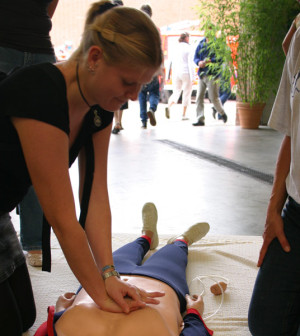- Are You Making This Expensive Thermostat Error This Winter?
- Recognizing the Signs of Hypothyroidism
- 10 Strategies to Overcome Insomnia
- Could Artificial Sweeteners Be Aging the Brain Faster?
- Techniques for Soothing Your Nervous System
- Does the Water in Your House Smell Funny? Here’s Why
- Can a Daily Dose of Apple Cider Vinegar Actually Aid Weight Loss?
- 6 Health Beverages That Can Actually Spike Your Blood Sugar
- Treatment Options for Social Anxiety Disorder
- Understanding the Connection Between Anxiety and Depression
Sleep Apnea Linked to Raised Stroke Risk in Women, Too


The link between sleep apnea and stroke appears to be as strong in women as in men, a new study says.
Because men tend to develop obstructive sleep apnea before women, previous studies may have underestimated the connection between sleep apnea and stroke in women, according to the study’s authors.
“Our results could have a substantial impact on our thinking of the risks associated with sleep apnea in women,” the study’s lead author, Dr. Suzie Bertisch, of Beth Israel Deaconess Medical Center in Boston, said in a news release from the American Thoracic Society.
“From a clinical standpoint, the results could help clinicians provide more proactive treatment for reducing cardiovascular risk in their female [sleep apnea] patients,” she added.
Obstructive sleep apnea is a common disorder that causes shallow breathing or repeated pauses in breathing during sleep, according to the U.S. National Heart, Lung, and Blood Institute. The pauses can last a few seconds or minutes. Common signs of sleep apnea include snoring, choking or gasping sounds, morning headaches and excessive daytime sleepiness.
For the current study, researchers examined data from more than 5,400 people who took part in a long-term study of how sleep apnea affects heart health. The average follow-up time in the study was more than 11 years.
The analysis revealed that sleep apnea increases the chance of stroke and that the risk is equally high in women and men.
The study was scheduled for presentation Tuesday at the American Thoracic Society’s annual meeting in San Diego. Research presented at meetings is generally considered preliminary until results are published in a peer-reviewed journal.
Bertisch said further research is needed to see if sleep apnea treatment lowers stroke risk in both men and women, and also called for additional studies of sleep apnea in women.
More information
The U.S. National Heart, Lung, and Blood Institute has more about sleep apnea.
Source: HealthDay
Copyright © 2026 HealthDay. All rights reserved.










